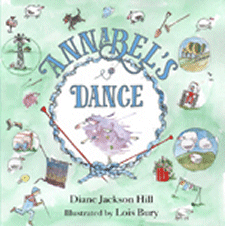Annabel’s Dance
Diane Jackson Hill
Lois Bury
Wombat Books, 2016
32pp. hbk., RRP $A24.99
9781925139358
High in the mountains lived a mob of sheep – ordinary sheep with wool the colour of whipped cream growing in neat tight crinkles. With them lived Annabel who was the colour of a mud puddle and whose wool was straight and spiky. She couldn’t just stand and nibble grass all day – her legs went every which way, she flipped head over heels, she was always wriggling and jiggling. She was picky with her food because the grass prickled her tongue , she hid at shearing time and loud noises hurt her ears. No matter how hard she tried, Annabel just didn’t fit into the mob and they shuffled her to the outside.
“Hazy mazy, oops a daisy, wriggle your ears but don’t go crazy,” she’d tell herself whenever she felt alone or was trying to be brave.
Because she hid every time it was shearing time, for six years her wool grew and grew and grew. But even though it kept her warm and protected her from bumps, she couldn’t see or hear very well and one day…
Annabel is super-sensitive to the world around her and even when Farmer Shanks tries to help her, she can’t cope and makes a dash for the mountainside. But he is determined and calls in extra help, gives her headphones to block out the sound of the shearing machine and even puts a bucket of strawberry clover nearby so she can imagine herself still out on the mountainside.
Annabel is like those students we have who are somewhere on the autism spectrum, whose sensitivities are so heightened they can’t cope with being touched or hearing loud noises, yet all they would like to do is be part of the mob. To belong. But instead of their differences being accepted and their needs catered for, they are shunned and left to themselves until eventually there is a catastrophe.
This is a humourous but poignant story that can be read on its surface level as being about an eccentric sheep or it can be explored more deeply to talk about how we, as people, are all unique each with our special needs and preferences. But some differences are not through choice and we need to be more tolerant and more inclusive, make allowances and reach out to help those who are struggling or marginalised through no fault of their own – just as Farmer Shanks did. There are many Annabels in our classrooms as there are many more children on the spectrum than those who qualify for special assistance so, as teachers, we need to vary our practices, help the child develop physical or mental strategies to cope, and inform the other students so they understand what is happening. Indeed, under federal legislation, we are obligated to do so but the crux of this book is that it puts us in Annabel’s world in a way few others stories do and gives some insight into a world that is too noisy and smelly and busy for some.

